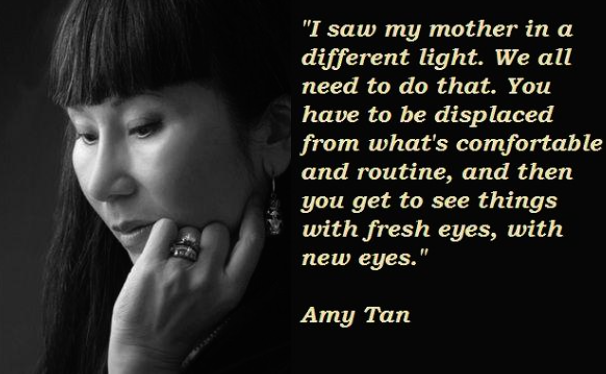During the first phase of this course, we learned about how linguistic standards can affect the experiences of certain individuals. The most meaningful element that stood out to me during this phase were the readings that expressed the oppression or discrimination against people who do not speak or write English in a conventional manner. Examples of readings that outlined this issue were “Mother Tongue” by Amy Tan and Nobody Mean More to Me Than You And the Future Life of Willie Jordan” by June Jordan. In June Jordan’s excerpt, it stood out to me how firm the author was in their belief that Black English should not be considered inappropriate, because 33 countries speak English, therefore it is inevitable that there will be many versions of Englishes spoken and not everyone will speak the same standard English, which is stated in the following quote from the reading: “Obviously, this tool, this “English,” cannot function inside thirty-three discrete societies on the basis of rules and values absolutely determined somewhere else, in a thirty-fourth other country, for example.”
The audience of my essay may be people who are looking to learn a new language and learn of my experience, or those who want to learn about the value and benefits of knowing to speak multiple languages. I tailored the narrative to this intended audience by first explaining the experiences that led to my learning of both of my languages, English and Arabic, then explained how these languages enable me to communicate with a larger number of people that would not have been possible if I did not learn a second language.
As I outlined in my narrative, the most impactful thing to my language learning experience of both of my languages was hearing others speaking them. For English, my first language, that was by hearing my older siblings speaking it, and for Arabic, it was through hearing others speaking it in shows and movies. Watching Arabic TV shows and movies as a child was played the most significant role in my development of language in Arabic, because it allowed me to hear others speaking the language.
One course learning outcome that I took away from this phase was “Examine how attitudes towards linguistic standards empower and oppress language users”. I achieved this learning outcome by the examples given from videos and readings during this phase that outlined how people were criticized for speaking different versions of English, or with a certain accent that was not considered the standard English. An example of this was in “Mother Tongue” by Amy Tan, when Amy’s mother was treated poorly at the doctor’s office just because of her accent in speaking English, since it is not her first language.


Being born in Brooklyn, English is my first language since it was the language I was most around during my childhood. My siblings played the largest role in my learning of English, since I was around them most of the day at home as a child, and I can remember hearing them talking and arguing with each other often. After I could speak basic English, going to school and hearing older students and teachers around me speaking also helped me learn to speak better and learn more phrases.
During my childhood, multiple important factors shaped the learning of my second language, Arabic. Two significant ways I learned at a young age was by watching Arabic shows and movies, and hearing other friends and family speak Arabic. Spending a lot of time watching these shows with my family significantly improved my ability to understand and speak Arabic better and allowed me to hear and learn new phrases and words in Arabic.
Watching these shows and movies in various dialects of Arabic also allowed me to start to better comprehend other versions of Arabic which were at first, very unfamiliar for me, since these dialects can differ quite a lot. For example, somebody who speaks Egyptian Arabic and is not familiar with Syrian or Yemeni Arabic or vice versa will most likely not understand even half of what is being said if it is spoken to them. Various versions of Arabic have different words for many things, a distinct style of speaking, and patterns and speed of talking. Knowing these other dialects allows me to also be able to conversate with people who speak in different ways which I would not have otherwise been able to speak with if I was unfamiliar with these other dialects, since the various dialects can be very alien to one exposed to a single one. A notable example of this is the common misunderstanding between Arabic-speakers where some say “Laban” meaning milk, which in other dialects, means yogurt.
My parents are originally from Egypt, so I grew up learning Egyptian Arabic, however watching shows and movies of other dialects allowed me to better understand dialects such as Syrian and Yemeni. Another important factor that allowed these unfamiliar dialects to start to be less unusual to me was hearing friends of other dialects of Arabic speaking to their families when I grew older.
One show in particular that I remember in particular that played the largest role in my Arabic literacy is a comedy show called Al Kabeer, which I used to spend a lot of time watching. I would repeatedly watch all episodes of the 5 seasons in this show, and nearly had every episode memorized from how many times I had watched all the episodes.
My learning of English and Arabic enables me to speak with many different people that are from various parts of the world, and while traveling to other countries as well. About 1.5 billion people speak English, and over 700 million people Arabic worldwide as either a first or foreign language. With such a large number (about 28% of the population) of people who speak either English or Arabic, I believe it is a powerful tool to know to speak and understand these languages as it allows me to connect with a large number of people.
There are many ways to learn new languages. For me, it was by hearing other people speak both my first and second languages. Watching shows improved my literacy in Arabic significantly, even though I did not intend to improve my language by watching them. The most significant benefit I saw of learning through watching shows, TV, and hearing others speak is that you experience the language second hand and see real conversations taking place, which I think is the best way to learn new languages or dialects quickly. I believe that the most important part of learning a new language is that you put yourself around it, where other people are speaking it, or being around other people who know the language you are trying to learn. In comparison to using a website or learning at school, I believe that actually hearing the language being naturally spoken will allow you to learn much faster and better. Learning a second language has impacted me as a person by exposing me to multiple cultures which I think is something that is invaluable. On a daily basis, I am able to use Arabic to speak to others which would not have been possible if I had only known my first language, English.
The audience of my essay is intended to be people who are trying to learn a new language and want to learn about other’s experiences or different ways that they can learn those new languages. The purpose of the essay is to inspire and motivate these people to learn a new language by giving possible ways to learn new languages and by showing that the experience can be interesting and how knowing to speak multiple languages is a powerful tool in communicating with the world around you.

